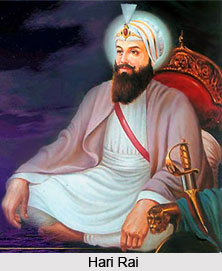 Hari Rai was the seventh Sikh Guru. He was nominated to be the Guru by his grandfather, Guru Hargobind. Hari Rai was an able and compassionate Guru of the Sikhs who preached a life of devotion and honesty in one`s dealings. Later in life he became embroiled in the Mughal battle of succession and due to the outcome of a series of affairs, he nominated his younger son Harikrishan as the next Guru.
Hari Rai was the seventh Sikh Guru. He was nominated to be the Guru by his grandfather, Guru Hargobind. Hari Rai was an able and compassionate Guru of the Sikhs who preached a life of devotion and honesty in one`s dealings. Later in life he became embroiled in the Mughal battle of succession and due to the outcome of a series of affairs, he nominated his younger son Harikrishan as the next Guru.
Early Life of Hari Rai
Guru Hari Rai was born in Kiratpur, formerly of District Hoshiarpur, which is the modern day Ropar District of Punjab. Kiratpur is located on the banks of the Sutlej River and is home to nine historic Gurdwaras. The Guru was born on the thirteenth day of the light half of the lunar month Magh, during the Sambat year of 1687, which corresponds to January 16, 1630 A.D. and is observed on January 31st of the Nanashahi Calendar. Guru Hari Rai was the son of Mata Nihal Kaur and Gurditta. He was trained and educated under the supervision of the sixth guru Sri Guru Hargobind Ji. Guru Hari Rai was adept in dealing with weapons and horses, having received martial training at a young age. When Guru Har Rai Ji grew up he maintained a militia of 2,200 men at arms but never fought a battle. As regards the details of the marriage and family of the Guru, it is not clear as there is no definite proof of the same. While some records suggest that Har Rai was married, at about age 10, to the seven daughters of the Sikh Daya Raam of Anupshahr who lived in Balundshahr District of Uttar Pradesh, there are others that say that he wed only Sulakhini, the daughter of Daya Rai, a Sillikhatri of Arup Shanker. There are other conflicting reports of his marriage as well, however they all indicate the same date. Har Rai fathered two sons and a daughter. Guru Hari Rai appointed his youngest son, Har Krishan, to be his successor.
Religious Life of Hari Rai
Hari Rai advocated a life of great religious devotion and compassion. He stressed the importance of early morning worship and scripture, implying that whether or not words could be understood, hymns benefited the heart and soul. He was a caring an d compassionate person who not only showed concerned for the predicament of others but helped them out in practical ways as well. Guru Hari Rai founded three missions and stressed the importance of `Langar,` insisting no one should ever be turned away hungry who visited them. He emphasised on certain essential ethical values that all Sikhs must possess. He said that they must labour honestly and cheat no one. To the rulers, he advised that they should be benevolent in their rule and show mercy to their subjects, they should stay away from drink and always be merciful towards their subjects. It was the ruler`s duty to take care of his subjects by providing them with all the amenities such as good roads. Drinking water, schools etc. Guru Hari Rai was also very compassionate towards animals and took care of the injured and wounded animals that he came across.
Later Life of Hari Rai
Guru Hari Rai became embroiled in the Mughal intrigue of succession when the Mughal emperor`s heirs fought over his throne and the eldest, Dara Shikoh, appealed to Guru Hari Rai for aid. The Guru incurred the displeasure of the ruthless younger brother, Aurangzeb, by detaining his army when he pursued Dara Shikoh. Meanwhile the Guru counseled Dara Shikoh that only a spiritual kingdom is everlasting. Aurangzeb eventually took over the throne. Aurangzeb eventually imprisoned Dara Shikoh and later called the Guru to his court. However, the Guru refused to comply and sent his eldest son Ram Rai instead. He was givens strict instructions by the Guru not to change the words of the Guru Granth Sahib under pressure from Aurangzeb. However Ram Rai succumbed and changed the wordings of the Bani. Consequently, Guru Ji bequeathed the Guruship to his younger son Harikrishan Ji and breathed his last on 16 October 1661 in Kiratpur. The Gurudwara Patalpuri is now situated at the place of his cremation.




















